Summary
Dr James Howard is a Senior Lecturer, BHF Intermediate Fellow and Honorary Consultant Cardiologist at Imperial College.
James' research focuses on using novel computational approaches to solve important problems in heart disease. His main research interest is the application of artificial intelligence (AI) to deliver individualised and efficient cardiac MRI scanning. However, he has experience in running clinical trials and applying AI in a variety of fields, including ultrasound scans, ECGs and X-rays.
His clinical and academic training has been supported by several prestigious fellowships, including an NIHR Academic Clinical Fellowship, a Wellcome Trust Clinical Research Training Fellowship, an NIHR Clinical Lectureship, and most recently a BHF Intermediate Clinical Research Fellowship. He has secured over £1 million of research funding.
He was recently awarded his PhD, “Deep Learning Using Convolutional Neural Networks in Clinical Cardiology”. He has published extensively in the field of cardiovascular medicine, particularly artificial intelligence (AI) and he was recently awarded a $40,000 prize by Facebook, Microsoft and Amazon for his work on detecting 'fake news' using AI.
James read Clinical Medicine at Trinity College, the University of Cambridge, where he also undertook his BA in Natural Sciences. Alongside his medical training he has undertaken postgraduate qualifications in Clinical Trials from the London School of Hygiene and Tropical Medicine, and in Medical Education from the University of Cardiff.
Why are statin side effects so common? Using smartphones to solve the mystery
James was joint first author on the SAMSON trial, published in the New England Journal of Medicine. This novel "N-of-1" trial used smartphones to assess daily symptoms in patients who were previously unable to take statins, and showed that 90% of the symptom burden our patients suffer from taking statins is also present when they take placebo. The trial received widespread international interest (BBC; Daily Mail).
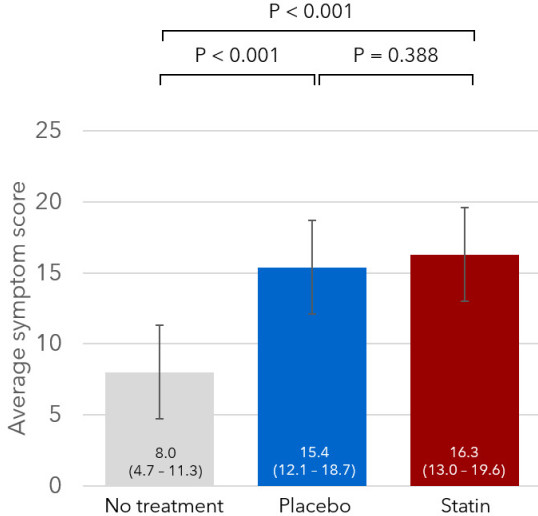
Artificial intelligence in cardiac imaging
James has published numerous papers which demonstrate the ability of artificial intelligence to solve problems in clinical cardiology. His research tends to focus on the use of convolutional neural networks. He emphasises the importance of these solutions making it from "bench-to-bedside", a common problem in AI research where systems are reported to have excellent performance, but never enter clinical practice. 2 of his artificial intelligence solutions for MRI scans are available for use at Hammersmith Hospital, and another on pacemaker identification is free to use through any web browser.
Automated cardiac MRI chamber quantification - LINK
James investigated whether deep learning of the sequences acquired in the first minutes of a scan could provide an early alert of abnormal features. It does this by segmenting out slices of the heart acquired at the start of a scan, and using these to reconstruct an accurate 3D model of the patient's heart. This solution is now in clinical use on the MRI scanners at Hammersmith Hospital.
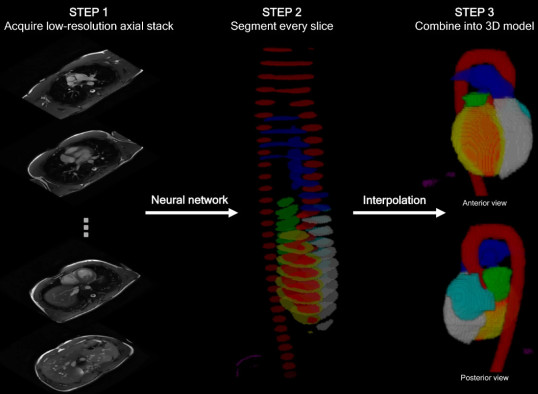
Pacemaker identification using neural networks - LINK
It's common for doctors to need to identify what model of pacemaker patients have during emergencies. James developed a free-to-use tool using AI which is able to accurately identify the model of pacemaker present on a chest X-ray, with far greater accuracy than that of a cardiologist.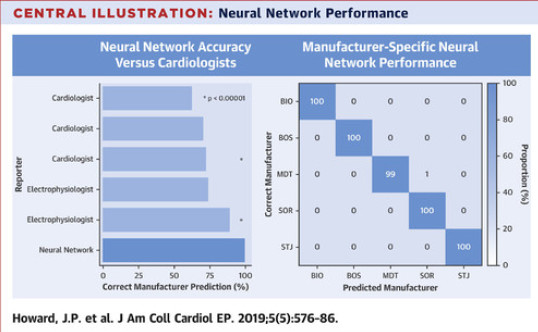
Cardiac pressure waveforms - LINK
The identification of adverse pressure signals during an angiogram, termed "damping", is necessary to maintain safety and the accuracy of coronary physiology measurements. James developed an AI which is able to accurately monitor these signals.
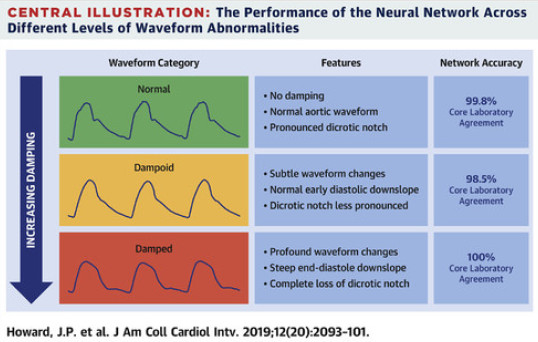
Echocardiogram interpretation - LINK
James developed a system which is able to analyse video clips taking during echocardiogram scans, to identify which anatomical structures are present. His novel approached more than halved the error rate of previous solutions.
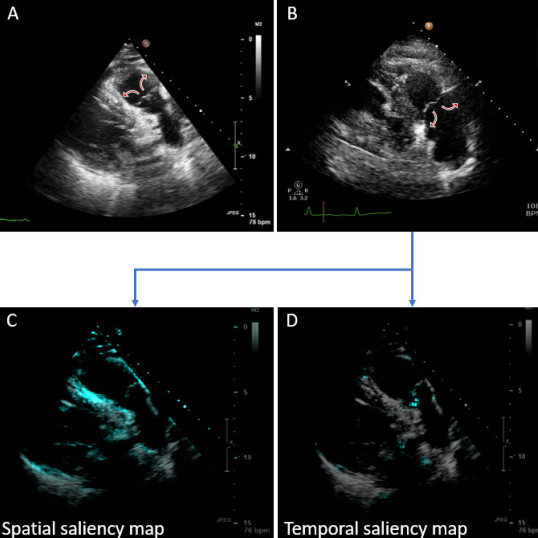
T1 and T2 mapping
T1 and T2 mapping allows quantitative analysis of tissue characteristics on cardiac MRI scans so that doctors can better identify diseases. However, these measurements can be difficult and time consuming to make. James has developed a system to automated this process and it is now in use at two Hospitals.
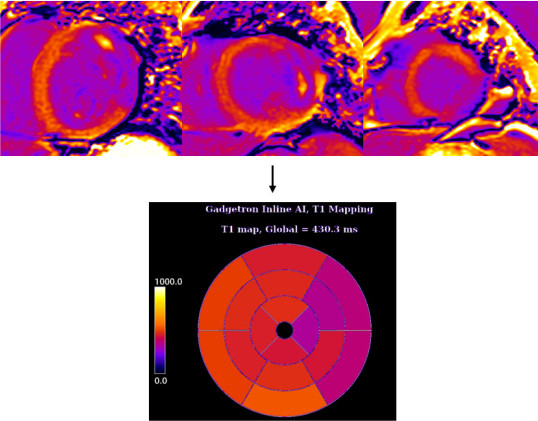
Identification of successful His pacing - LINK
James worked with Dr Ahran Arnold to develop a system to identify a novel form of cardiac pacing has been delivered successfully using ECGs.
Other work
CoPhy - Coronary physiology in Python - LINK
CoPhy free to use coronary physiology package that can calculate the common coronary physiology parameters including FFR, iFR, DFR, RFR, CFR, BSR, BMR and HMR. Parameters are given for full cycle,
diastole, systole and the wave-free period.
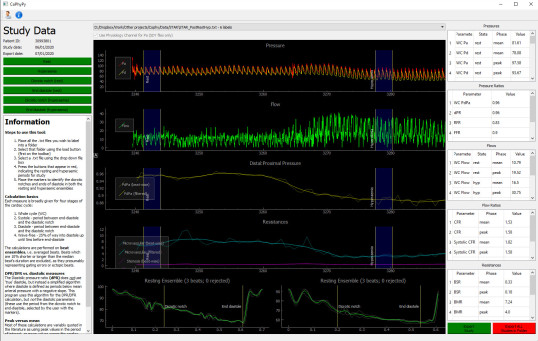
CardiologyTrials.org - The Cardiology Trials Database - LINK
James set up and runs the popular website CardiologyTrials.org, which serves as an independent, up to date summary of the key trials in clinical cardiology.
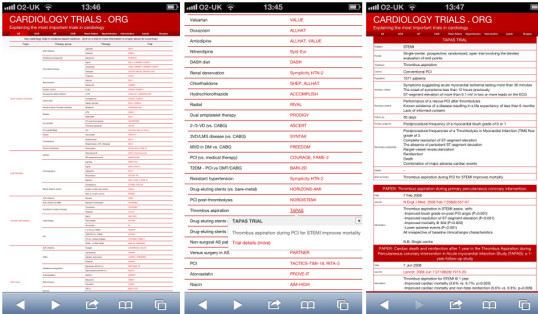
BARD ECG labelling system - LINK
An open source program to allow exporting of ECGs from the proprietary ‘BARD’ electrophysiology application. The program allows labelling of ECG waveforms to allow AI solutions to be trained on clinical ECG signals.
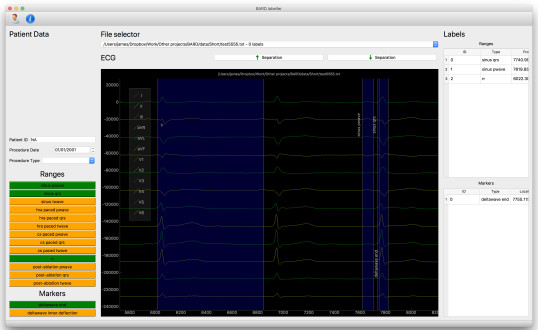
MetA-analysis
Dr Howard has published extensively throughout cardiovascular medicine (h-index 24), but his interest in trial design and medical statistics means he is often asked to co-author meta-analyses alongside his usual research interests. James has been responsible for the analysis in the following papers.
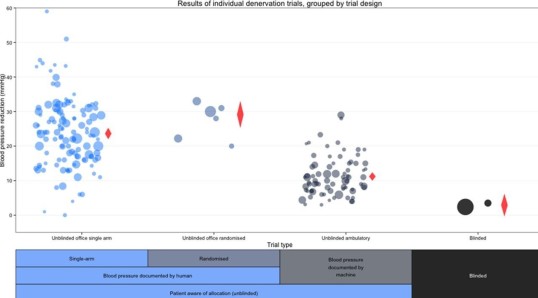
- Drug eluting stents versus bypass grafting - Eur. Heart J.
- Patent foramen ovale closure - Eur. Heart J.
- Influence of bias in renal denervation trial, a meta-regression - Heart & Circ. Cardiovasc. Qual. Outcomes
- Atrial fibrillation ablation - JACC Clin. Electrophysiol.
- PCI in stable and unstable CAD - Circ. Cardiovasc. Qual. Outcomes
- Pacing for hypertrophic obstructive cardiomyopathy - Eur. Heart J. Qual. Care Clin. Outcomes
- Meta regression predictors of outcome in AF ablation trials - Europace & J. Cardiovasc. Electrophysiol.
- Complete revascularisation in STEMI - J. Am. Heart Assoc.
- Cerebral embolic protection - Am. J. Cardiol.
- Renal denervation - Cardiovasc. Revasc. Med.
- Single versus dual antiplatelets in TAVI - Cardiovasc. Revasc. Med. & Open Heart
Publications
Journals
Vimalesvaran K, Zaman S, Howard J, et al., 2024, Aortic stenosis assessment from the 3-chamber cine: ratio of balanced steady-state-free-precession (bSSFP) blood signal between the aorta and left ventricle predicts severity, Journal of Cardiovascular Magnetic Resonance, Vol:26, ISSN:1097-6647
Alshahrani NS, Hartley A, Howard J, et al., 2024, Remote Acute Assessment of Cardiac Patients Post-Acute Coronary Syndrome (TELE-ACS): A Randomized Controlled Trial, Journal of the American College of Cardiology, ISSN:0735-1097
Zaman S, Vimalesvaran K, Chappell D, et al., 2024, Quality assurance of late gadolinium enhancement cardiac MRI images: a deep learning classifier for confidence in the presence or absence of abnormality with potential to prompt real-time image optimisation., J Cardiovasc Magn Reson
Foley MJ, Rajkumar CA, Ahmed-Jushuf F, et al., 2024, A double-blind, randomised, placebo-controlled trial of the coronary sinus Reducer in refractory angina: design and rationale of the ORBITA-COSMIC trial., Eurointervention, Vol:20, Pages:e216-e223
Foley M, Rajkumar CA, Ahmed-Jushuf F, et al., 2024, The ability of contemporary cardiologists to judge the ischemic impact of a coronary lesion visually., Cardiovasc Revasc Med, Vol:59, Pages:60-66

